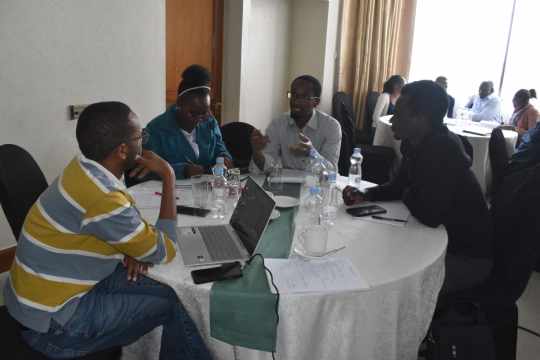There is a growing recognition of the need for Just Resilience – an approach that emphasizes inclusive climate adaptation strategies and prioritizes the needs of vulnerable populations. This concept and the challenges to achieve it were discussed at a stakeholder workshop organized by EfD Kenya on July 12, 2024.
EfD Kenya invited participants from the transport, waste, energy, and agriculture sectors to the workshop that took place at the Nairobi Safari Club. The participants were familiarised with the concept of Just Resilience and discussed in groups the existing landscape and challenges of the various sectors.
Just Resilience uses local knowledge and empowers communities by involving everyone in climate adaptation efforts and prioritizing the needs of the vulnerable to prevent worsening inequalities. It is anchored on three core principles: distributive justice, which ensures fair distribution of adaptation benefits; procedural justice, which guarantees inclusive decision-making processes; and restorative justice, which helps communities recover from past climate-related harms, such as floods.
Innocent Kabenga from the International Union for Conservation of Nature (IUCN) comments that financially disadvantaged individuals and communities, risk being excluded from climate adaptation efforts, undermining the goal of achieving just resilience. Thus, there is a need to set aside funds for climate adaptation, earmarked for them.
Green transport initiatives
Stakeholders in the transport sector highlighted several Just Resilience initiatives, including non-motorized transport options like bike racks and footpaths which promote cycling and walking, and green transport solutions such as electric buses with hybrid charging points of solar and grid power reducing fuel emissions. Companies such as Citi Hoppa and Metro are adopting electric buses. Plans are underway for the Bus Rapid Transit (BRT) and Mass Rapid Transit (MRT) systems to ease congestion. Furthermore, an intelligent transportation system with cameras for real-time traffic updates is being developed, and solar street lighting and roadside greening projects are being implemented.
Also, the National Climate Change Action Plan (NCCAP) 2018-2022 prioritized climate-proofing at least 4000km of roads to manage water harvesting and mitigate floods. Climate-proofing measures for roads encompass improved planning and design, functional drainage systems, use of durable materials, slope stabilization techniques, landscaping, stone pitching, tree planting, among other strategies.
However, the sector faces several challenges, including vandalism of trees and street furniture, and engineers neglecting social considerations in bridge design. More so, limited resources hinder the construction of high-quality, climate-proof roads, leading to structures that cannot endure extreme weather events.
Shift from hydropower to other renewables
Participants in the energy sector discussion revealed the significant transition from reliance on hydropower to using other renewable sources like geothermal and solar power, that are unaffected by dry seasons. Plans are also underway to incorporate nuclear power, with a site for a nuclear plant designated in Kilifi. Additionally, there is a shift towards cleaner cooking fuels, such as LPG and Koko gas, to help reduce air pollution.
Challenges in this sector include the high costs of establishing power plants, which raises the price of renewable energy. The low willingness of people to pay for clean cooking fuels hampers their adoption. Also, unsustainable government energy subsidies lead to volatile energy prices.
Waste innovations create livelihoods
The circular economy has transformed waste management by repurposing waste materials. Farmers are venturing into Black Soldier Fly farming and using organic waste for fertilizer and feed. This has created livelihoods, particularly for young people, and helps reduce pollution. Some school communities are implementing waste separation practices to educate students on their role in effective waste management. Moreover, there are plans to collaborate with youth on developing a plastic recycling curriculum. The Kenya Private Sector Alliance (KEPSA) has also created a gender mainstreaming toolkit for waste management.
Nevertheless, irresponsible human behavior results in the improper separation of organic and inorganic waste. There is also a lack of policy harmonization between national and county governments which complicates waste management. Insufficient landfills cause waste to be dumped near residential areas, posing health risks. The youth do not see the waste sector as a clean job. The sector also lacks legal protection for waste pickers leaving them vulnerable to being evicted by the government. They also face competition from cartels.
Agricultural techniques for resilience
The workshop also featured discussions on several agriculture adaptation strategies. These include the use of climate-smart agriculture such as the use of drought-resistant crops, efficient use of water, adoption of organic farming to preserve soil quality and food safety, using special storage facilities to preserve produce for long periods, improved record-keeping monitoring change in productivity and potentially linking to climate change. Furthermore, climate information is used to make decisions on planting and harvesting.
The challenge is that weather and climate experts often fail to communicate effectively with ordinary citizens. As a result, many people are unaware of predicted weather events and put their lives or livelihoods at risk. Additionally, people avoid attending public sensitization forums due to their negative attitude towards the government.
“There is a need to foster inclusivity and participation from the public and different stakeholders to drive the agenda for Just Resilience,” said Innocent Kabenga of IUCN.
By: Jane Maina
